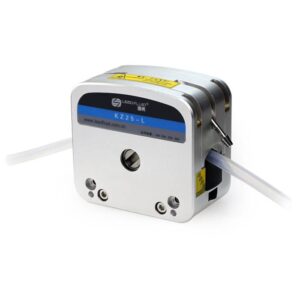Tubing Internal Diameter: Generally, larger tubing internal diameters allow for higher flow rates, as they offer more space for fluid to flow through with each pump revolution. Peristaltic pumps for sale typically offer a range of tubing sizes to accommodate different flow rate requirements.
Tubing Wall Thickness: Thicker-walled tubing provides greater structural integrity and resistance to wear, but it may also increase friction between the tubing and the pump rollers, potentially reducing flow rates. Thinner-walled tubing may offer higher flow rates due to reduced resistance but may be more susceptible to wear and damage.
Tubing Material: The material composition of the tubing can influence its flexibility, durability, and frictional properties, all of which impact flow rates. Some materials may offer lower friction coefficients, allowing for smoother fluid movement and higher flow rates.
Tubing Compression: Peristaltic pumps work by compressing flexible tubing to create fluid displacement. The degree of tubing compression affects the volume of fluid displaced with each pump revolution, thereby influencing flow rates. Adjusting the tubing compression ratio can help optimize flow rates for different tubing sizes and materials.
Pump Design and Motor Speed: The design of the peristaltic pump head, including the size and arrangement of the rollers, and the speed of the pump motor also play roles in determining flow rates. Higher pump speeds and more efficient pump designs may facilitate higher flow rates, regardless of tubing size.
In summary, the relationship between tubing size and flow rate in peristaltic pumps for sale is complex and depends on various factors, including tubing internal diameter, wall thickness, material composition, compression, pump design, and motor speed. Understanding these factors and their interactions is essential for selecting the appropriate tubing size to achieve the desired flow rates in different applications.

Previous: How Induction Heating Is Used in Medical Device Manufacturing
Next: What is the difference between mechanical press and hydraulic press?
Copyright:@2020-2021
Comments Please sign in or sign up to post.
0
0 of 500 characters used